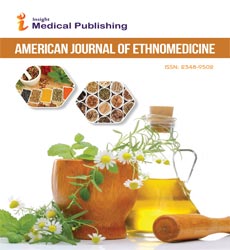ISSN : 2348-9502
American Journal of Ethnomedicine
Historical Use of Herbal Medicine
Juming Geurdes*
Department of Medicine, University of Kashihara, Sousse, Tunisia
- *Corresponding Author:
- Juming Geurdes
Department of Medicine, University of Kashihara, Sousse, Tunisia
E-mail: Jumingeurdes99@gmail.com
Received Date: September 07, 2021; Accepted Date: September 21, 2021; Published Date: September28, 2021
Citation: Geurdes J (2021) Historical Use Of Herbal Medicine. Am J Ethnomed Vol.8 No.8:e001.
Editorial Note
By definition, “traditional" use of herbal remedies implies significant historical use, and this is certainly true of many products available as "traditional herbal remedies". In many developing countries, a large part of the population depends on traditional naturopaths and their arsenal of medicinal plants to meet health care needs. Although modern medicine can coexist with this traditional practice, herbal medicines have often remained popular for historical and cultural reasons. These products are commercially available on a large scale, particularly in industrialized countries. In this modern setting, ingredients are sometimes marketed for uses never considered in the traditional healing systems from which they emerged. While herbal medicines are subject to strict manufacturing regulations in some countries, this is not the case everywhere. In Germany, for example, herbal products sold as "herbal medicines" are subject to the same criteria for efficacy, safety and quality as other medicines. In contrast, in the United States, the majority of herbal products on the market are marketed and regulated as dietary supplements, a category of products that does not require prior approval of products based on any of these criteria.
Traditional Herbal Practices
One of the most difficult problems in translating traditional herbal practices into conventional "Western" medicine is customizing recipes that contain multiple herbal and other ingredients. There is little incentive to standardize products for a mass market when the intention was to provide a personalized recipe. For the traditionally trained small farmer or herbalist, standardization means understanding growing conditions, time of harvest, type of extraction, or other processing of materials in order to offer people a reliable (albeit low) active ingredient. For manufacturers or distributors of large quantities that are sold in a supermarket or health food store, standardization refers to industrial production under defined conditions using the so called Good Manufacturing Practices (GMP) similar to those that are used for the manufacture of medicines.
In the United States, herbal products are manufactured on a small and large scale, and their content and quality can vary widely in the marketplace. US regulations do not yet require dietary supplement manufacturers to adhere to standard manufacturing practices, so quality is not guaranteed. The public is discouraged by reports that products being recalled from shelves do not consistently contain the ingredients, or in the amounts, indicated on the label. For commonly used herbal products, evidence of efficacy may be based on traditional use, reports of experiences, controlled and uncontrolled clinical trials, and randomized, double-blind, controlled trials. In most cases, however, systematic clinical studies to support the claims are lacking. The safety of some herbal ingredients has been questioned recently, in part due to the identification of side effects associated with their use and, increasingly, due to evidence of clinically relevant interactions between herbs and prescription drugs.
Adverse events (stroke, heart attack, cardiac arrhythmia, liver toxicity, seizures, psychosis, and death) related to the use of ephedra for weight loss, bodybuilding effects and increased energy, or kavakava (also known as kawa), which is widespread and growing in Europe. For example, Canada for the treatment of anxiety, nervousness, insomnia, pain and muscle tension has led some countries to enact regulations that restrict or prohibit these products. Few common herbs are suspected of causing cancer.
This paper concludes that the medicinal plants are an important source of molecules with medicinal properties due to the presence of natural compounds. Herbal medicines are useful in curing human diseases and play an important role in healing due to the presence of phytochemicals.
Open Access Journals
- Aquaculture & Veterinary Science
- Chemistry & Chemical Sciences
- Clinical Sciences
- Engineering
- General Science
- Genetics & Molecular Biology
- Health Care & Nursing
- Immunology & Microbiology
- Materials Science
- Mathematics & Physics
- Medical Sciences
- Neurology & Psychiatry
- Oncology & Cancer Science
- Pharmaceutical Sciences
